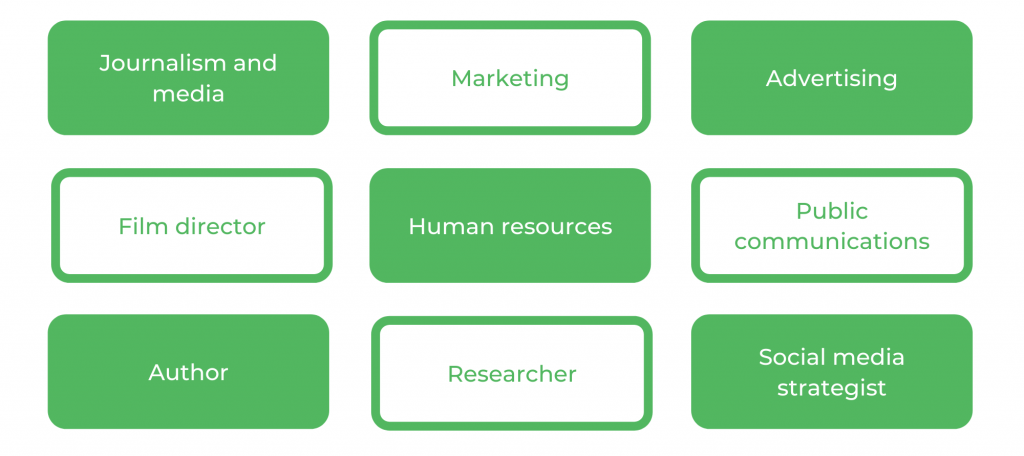
So, you pretty much know all the details and info on studying a Bachelor of Communication at UTS — take a quick look here if you don’t!
But you want to know how people really feel about this degree?
Well, we’ve got you covered! Meet Cordelia, a current UTS Comms student (Journalism major) and Alec, a recent UTS Comms graduate (Media, Arts and Production and Journalism major). We ask them those questions you really want to know the answers to!
Let’s get to it!
Why should you study a Communications degree at UTS?
Top 3 Pros of a Comms Degree
Top 3 Cons of a Comms Degree
Mistakes You Shouldn’t Make
Things to Know Before Starting UTS Communications
What Makes this Degree Different
Motivations for Studying UTS Communications
Potential Career Paths
Why should you study a Communications degree at UTS?

You can also tailor a Bachelor of Communication to what you’re most interested in because there are six exciting and different majors to choose from! Alongside this, the core communication subjects help to develop your critical thinking and understanding of society and the media.
Top 3 Pros of a Comms Degree
#1: Practical experience
UTS Communications is all about learning by doing! Of course, there is still some theory involved but from day one, the focus is on practical experience. That means, you’re interviewing someone for a story, making a short film, creating a new social media campaign or conducting research for a project.
“I think that’s just been my favourite thing — how a lot of the assignments and focus isn’t on theory behind journalism, it’s more about just going out and doing it because the best way of learning is on the job,” said Cordelia.
#2: There are barely any exams
Yep, you heard it right! Communications at UTS barely has any exams because it’s more assessment focused — which goes hand in hand with all that practical experience.
“It’s a lot more of that just collaborative, we all have to work together to do these stories, instead of individually studying for an exam — which I really like,” said Cordelia.
#3: Access to awesome equipment
If you’re making films, video stories and so on, then you want the best equipment! Well, UTS has media labs with all that funky software, a fully decked out studio and even their own equipment store. We’re talking video cameras, recording equipment, lighting systems and more!
“That’s probably the biggest thing for media students — just having access to the tools you need to create your final product so you’re not disadvantaged in any way,” said Cordelia.
Top 3 Cons of a Comms Degree
#1: Electives can be a bit general
Yeah, it’s true — the electives that UTS offer can be fairly general! They can be anything from Arguments, Evidence and Intuition to Culture: Plugged and unplugged to Design Media Industries and so on.

#2: Not everyone works as hard you
And that can be quite annoying when you have a group assignment. You’ll sometimes have to work with people who are the complete opposite to you, aren’t as motivated or maybe aren’t really interested in being there.
Alec tells us, “You usually have to push well above your own weight to achieve the things you want to achieve in your degree.”
#3: You do a bit of everything
Even though you specialise in your major/s, there’s different aspects to it and you’ll cover all of these. That means if you’re really into creating video stories, you’ll still have to do written stories, multimedia stories and so on.
“I’d say my least favourite thing about the degree is that you kind of have to study everything even though it might not be what you’re interested in — although, I guess it’s a good thing,” said Cordelia.
Any regrets?
“In hindsight, I wished I had picked another major because I would have rather been specialising in another form of Communication rather than doing some of the general electives I’ve had to do,” said Cordelia.
For Alec, he didn’t really have any regrets and said, “I was pretty happy with it. Maybe I kind of wished that I wasn’t rushed through so many assignments, but I also did want to finish my degree within three years.”
What do you wish you had known before starting the degree?
#1: Really think about your second major
During your first year, you have to choose two majors and after that, you can either keep it (like Alec did) or drop it and pick up electives (like Cordelia did).
Cordelia has some great advice on this and says, “Consider the second thing you want to study because even if it’s not the field you’ll end up working in, it actually does impact a lot of your degree at UTS — which is something I did not realise.”
#2: Media, Arts and Production can’t be your second major
But that’s absolutely fine because if you want to take it, you just have to choose it as your first major and then you can take any of the other majors as your second one. That’s exactly what Alec did!
It’s definitely a good thing to know though because you don’t want to miss out on having the chance to do this awesome major.
#3: Take on internship opportunities
Although internships aren’t a requirement of the degree, UTS does provide opportunities and the tutors also have their contacts! “In journalism, we’re getting emails like three times a week with different job opportunities or internships and it’s not just ones that they’re publicly advertising for,” said Cordelia.
She added, “You just get those unique opportunities to get involved with the industry and really that just comes down to the tutors having those connections.”
“Most of the tutors work in the industry or are really connected — pretty much like my current job, I got through my tutor. So, just having those direct contacts with successful people in the industry was a big part why I chose UTS.”
What makes this degree different from the ones offered at other universities?
#1: The degree is industry-focused
That’s what is one of the best parts about studying a Bachelor of Communication at UTS — they’re so industry focused and get you out there in the world, doing jobs that you actually would possibly do when you leave uni!
“I don’t know of any other uni that really does that — makes you feel like you’re working in the industry already,” said Alec.
#2: You do what you love from the first year
You get to specialise from the very first year! That means you start your majors and don’t have to survive a general first year of only compulsory subjects.
“So, it’s really basically no time wasting, you get straight into the stuff you’re actually really interested in,” Alec tells us.
#3: Awesome tutors
The tutors are all passionate about what they do and they’re actually working in the industry, so they really know what it’s like.
“I’ve met some amazing tutors that really care about their students and go out of their way to offer them opportunities that we wouldn’t have actually gotten anyway else,” said Alec.
What inspired you to choose this degree?
Cordelia was one of those lucky students who knew what she wanted to do for a long time: “I’ve pretty much always wanted to be a journalist since I was maybe 7— I was obsessed with the news.”
Cordelia added, “I read about the UTS Communications degree, and especially the Journalism major and it just really resonated with me. How hands on it was, the lack of exams and just the study of media — it was what I wanted to do.”
Now, for Alec, he was really interested in film and television and loved the idea that he could do a double major at UTS! He wasn’t actually planning on going to UTS but after an Open Day there, he was sold.
He tells us, “Basically their ethos and teaching style was a lot more industry focused and modern rather than old timely university, scholarly type of teaching — so that’s why I chose UTS.”
What are the possible career paths?

Well, the great thing about a Communications degree is that the skills learned are so versatile! There are so many different fields you could find yourself working in as communicators are needed everywhere:
-
- Journalism and media
- Marketing
- Advertising
- Film director
- Human resources
- Public communications
- Author
- Researcher
- Social media strategist
Tanna Nankivell is a Content Writer at Art of Smart Education and is currently in Germany completing a year of study for her double degree in Communications (Journalism) and Bachelor of Arts (International Studies). She has had articles published on Central News – the UTS Journalism Lab and wrote a feature piece for Time Out Sydney during her internship. Tanna has a love for travel and the great outdoors, you’ll either find her on the snowfields or in the ocean, teaching aqua aerobics or creating short films.


